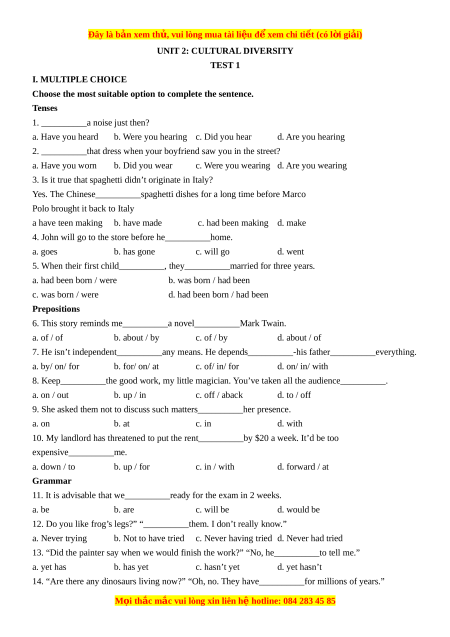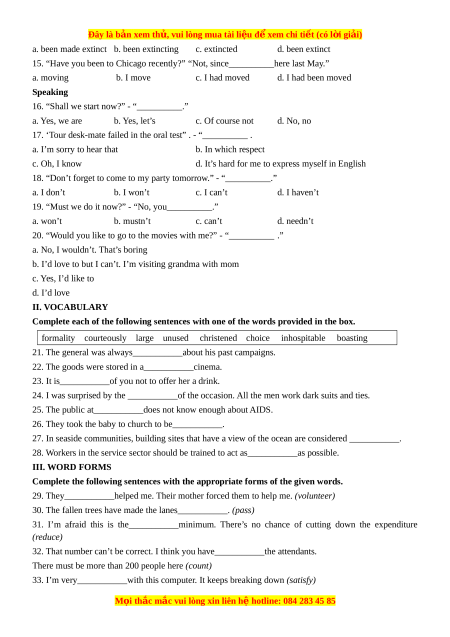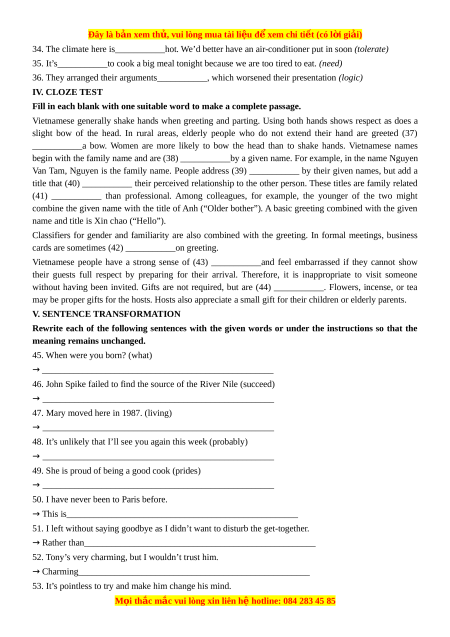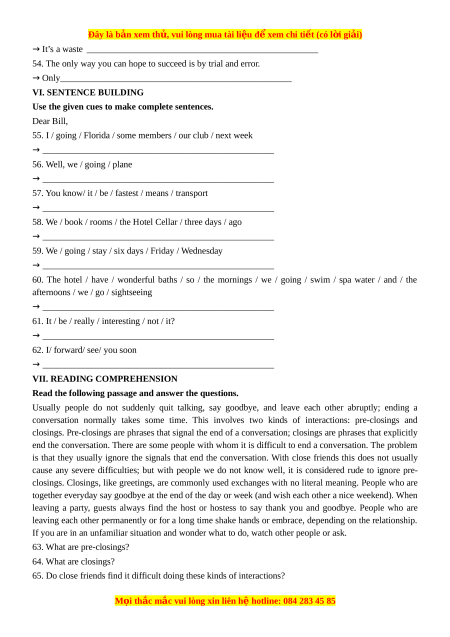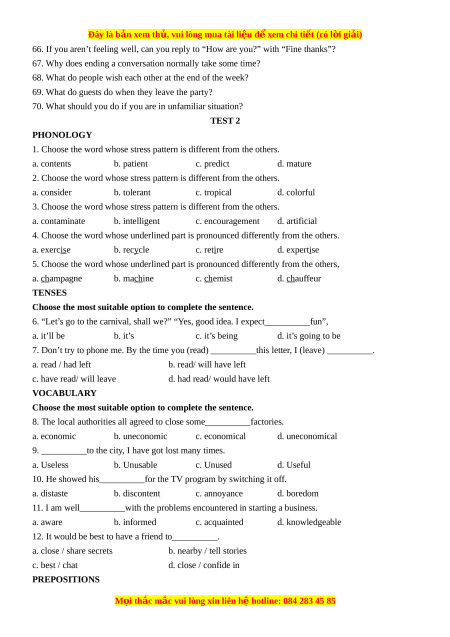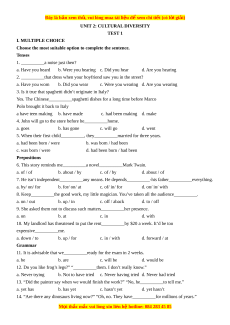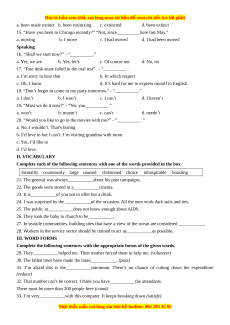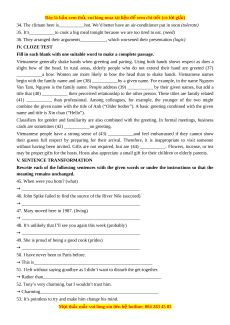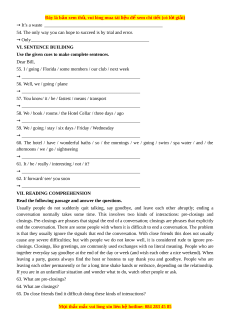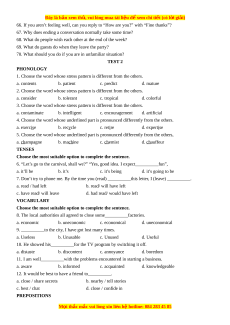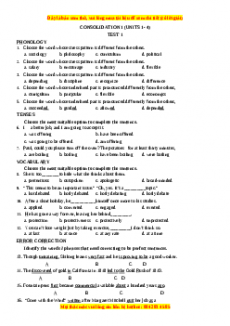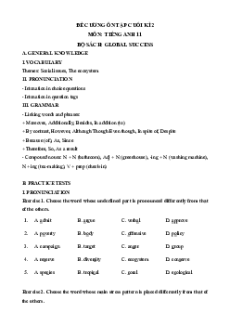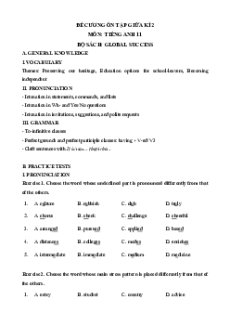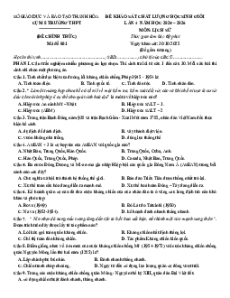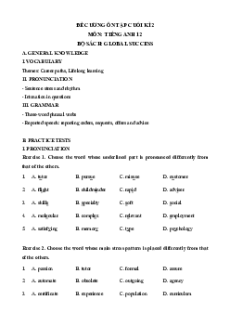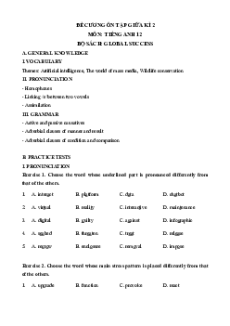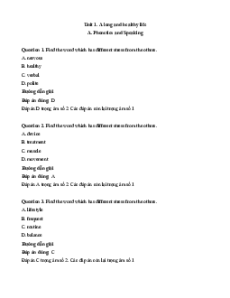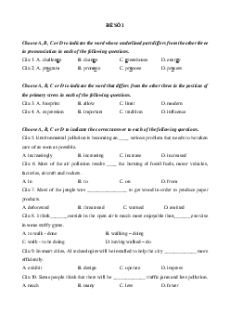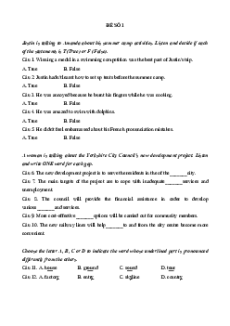ệ đ xe ể m chi ti t ế (có l i ờ gi i ả )
UNIT 2: CULTURAL DIVERSITY TEST 1 I. MULTIPLE CHOICE
Choose the most suitable option to complete the sentence. Tenses
1. __________a noise just then? a. Have you heard
b. Were you hearing c. Did you hear d. Are you hearing
2. __________that dress when your boyfriend saw you in the street? a. Have you worn b. Did you wear
c. Were you wearing d. Are you wearing
3. Is it true that spaghetti didn’t originate in Italy?
Yes. The Chinese__________spaghetti dishes for a long time before Marco Polo brought it back to Italy
a have teen making b. have made c. had been making d. make
4. John will go to the store before he__________home. a. goes b. has gone c. will go d. went
5. When their first child__________, they__________married for three years. a. had been born / were b. was born / had been c. was born / were d. had been born / had been Prepositions
6. This story reminds me__________a novel__________Mark Twain. a. of / of b. about / by c. of / by d. about / of
7. He isn’t independent__________any means. He depends__________-his father__________everything. a. by/ on/ for b. for/ on/ at c. of/ in/ for d. on/ in/ with
8. Keep__________the good work, my little magician. You’ve taken all the audience__________. a. on / out b. up / in c. off / aback d. to / off
9. She asked them not to discuss such matters__________her presence. a. on b. at c. in d. with
10. My landlord has threatened to put the rent__________by $20 a week. It’d be too expensive__________me. a. down / to b. up / for c. in / with d. forward / at Grammar
11. It is advisable that we__________ready for the exam in 2 weeks. a. be b. are c. will be d. would be
12. Do you like frog’s legs?” “__________them. I don’t really know.” a. Never trying
b. Not to have tried c. Never having tried d. Never had tried
13. “Did the painter say when we would finish the work?” “No, he__________to tell me.” a. yet has b. has yet c. hasn’t yet d. yet hasn’t
14. “Are there any dinosaurs living now?” “Oh, no. They have__________for millions of years.” M i
ọ thắc mắc vui lòng xin liên hệ hotline: 084 283 45 85
ệ đ xe ể m chi ti t ế (có l i ờ gi i ả )
a. been made extinct b. been extincting c. extincted d. been extinct
15. “Have you been to Chicago recently?” “Not, since__________here last May.” a. moving b. I move c. I had moved d. I had been moved Speaking
16. “Shall we start now?” - “__________.” a. Yes, we are b. Yes, let’s c. Of course not d. No, no
17. ‘Tour desk-mate failed in the oral test” . - “__________ . a. I’m sorry to hear that b. In which respect c. Oh, I know
d. It’s hard for me to express myself in English
18. “Don’t forget to come to my party tomorrow.” - “__________.” a. I don’t b. I won’t c. I can’t d. I haven’t
19. “Must we do it now?” - “No, you__________.” a. won’t b. mustn’t c. can’t d. needn’t
20. “Would you like to go to the movies with me?” - “__________ .”
a. No, I wouldn’t. That’s boring
b. I’d love to but I can’t. I’m visiting grandma with mom c. Yes, I’d like to d. I’d love II. VOCABULARY
Complete each of the following sentences with one of the words provided in the box.
formality courteously large unused christened choice inhospitable boasting
21. The general was always___________about his past campaigns.
22. The goods were stored in a___________cinema.
23. It is___________of you not to offer her a drink.
24. I was surprised by the ___________of the occasion. All the men work dark suits and ties.
25. The public at___________does not know enough about AIDS.
26. They took the baby to church to be___________.
27. In seaside communities, building sites that have a view of the ocean are considered ___________.
28. Workers in the service sector should be trained to act as___________as possible. III. WORD FORMS
Complete the following sentences with the appropriate forms of the given words.
29. They___________helped me. Their mother forced them to help me. (volunteer)
30. The fallen trees have made the lanes___________. (pass)
31. I’m afraid this is the___________minimum. There’s no chance of cutting down the expenditure (reduce)
32. That number can’t be correct. I think you have___________the attendants.
There must be more than 200 people here (count)
33. I’m very___________with this computer. It keeps breaking down (satisfy) M i
ọ thắc mắc vui lòng xin liên hệ hotline: 084 283 45 85
ệ đ xe ể m chi ti t ế (có l i ờ gi i ả )
34. The climate here is___________hot. We’d better have an air-conditioner put in soon (tolerate)
35. It’s___________to cook a big meal tonight because we are too tired to eat. (need)
36. They arranged their arguments___________, which worsened their presentation (logic) IV. CLOZE TEST
Fill in each blank with one suitable word to make a complete passage.
Vietnamese generally shake hands when greeting and parting. Using both hands shows respect as does a
slight bow of the head. In rural areas, elderly people who do not extend their hand are greeted (37)
___________a bow. Women are more likely to bow the head than to shake hands. Vietnamese names
begin with the family name and are (38) ___________by a given name. For example, in the name Nguyen
Van Tam, Nguyen is the family name. People address (39) ___________ by their given names, but add a
title that (40) ___________ their perceived relationship to the other person. These titles are family related
(41) ___________ than professional. Among colleagues, for example, the younger of the two might
combine the given name with the title of Anh (“Older bother”). A basic greeting combined with the given
name and title is Xin chao (“Hello”).
Classifiers for gender and familiarity are also combined with the greeting. In formal meetings, business
cards are sometimes (42) ___________on greeting.
Vietnamese people have a strong sense of (43) ___________and feel embarrassed if they cannot show
their guests full respect by preparing for their arrival. Therefore, it is inappropriate to visit someone
without having been invited. Gifts are not required, but are (44) ___________. Flowers, incense, or tea
may be proper gifts for the hosts. Hosts also appreciate a small gift for their children or elderly parents. V. SENTENCE TRANSFORMATION
Rewrite each of the following sentences with the given words or under the instructions so that the meaning remains unchanged.
45. When were you born? (what)
→ ___________________________________________________
46. John Spike failed to find the source of the River Nile (succeed)
→ ___________________________________________________
47. Mary moved here in 1987. (living)
→ ___________________________________________________
48. It’s unlikely that I’ll see you again this week (probably)
→ ___________________________________________________
49. She is proud of being a good cook (prides)
→ ___________________________________________________
50. I have never been to Paris before.
→ This is___________________________________________________
51. I left without saying goodbye as I didn’t want to disturb the get-together.
→ Rather than___________________________________________________
52. Tony’s very charming, but I wouldn’t trust him.
→ Charming___________________________________________________
53. It’s pointless to try and make him change his mind. M i
ọ thắc mắc vui lòng xin liên hệ hotline: 084 283 45 85
ệ đ xe ể m chi ti t ế (có l i ờ gi i ả )
→ It’s a waste ___________________________________________________
54. The only way you can hope to succeed is by trial and error.
→ Only___________________________________________________ VI. SENTENCE BUILDING
Use the given cues to make complete sentences. Dear Bill,
55. I / going / Florida / some members / our club / next week
→ ___________________________________________________ 56. Well, we / going / plane
→ ___________________________________________________
57. You know/ it / be / fastest / means / transport
→ ___________________________________________________
58. We / book / rooms / the Hotel Cellar / three days / ago
→ ___________________________________________________
59. We / going / stay / six days / Friday / Wednesday
→ ___________________________________________________
60. The hotel / have / wonderful baths / so / the mornings / we / going / swim / spa water / and / the
afternoons / we / go / sightseeing
→ ___________________________________________________
61. It / be / really / interesting / not / it?
→ ___________________________________________________ 62. I/ forward/ see/ you soon
→ ___________________________________________________ VII. READING COMPREHENSION
Read the following passage and answer the questions.
Usually people do not suddenly quit talking, say goodbye, and leave each other abruptly; ending a
conversation normally takes some time. This involves two kinds of interactions: pre-closings and
closings. Pre-closings are phrases that signal the end of a conversation; closings are phrases that explicitly
end the conversation. There are some people with whom it is difficult to end a conversation. The problem
is that they usually ignore the signals that end the conversation. With close friends this does not usually
cause any severe difficulties; but with people we do not know well, it is considered rude to ignore pre-
closings. Closings, like greetings, are commonly used exchanges with no literal meaning. People who are
together everyday say goodbye at the end of the day or week (and wish each other a nice weekend). When
leaving a party, guests always find the host or hostess to say thank you and goodbye. People who are
leaving each other permanently or for a long time shake hands or embrace, depending on the relationship.
If you are in an unfamiliar situation and wonder what to do, watch other people or ask. 63. What are pre-closings? 64. What are closings?
65. Do close friends find it difficult doing these kinds of interactions? M i
ọ thắc mắc vui lòng xin liên hệ hotline: 084 283 45 85
Trắc nghiệm Unit 2: Cultural diversity Tiếng Anh 12 - Mai Lan Hương
679
340 lượt tải
MUA NGAY ĐỂ XEM TOÀN BỘ TÀI LIỆU
CÁCH MUA:
- B1: Gửi phí vào TK:
1133836868- CT TNHH DAU TU VA DV GD VIETJACK - Ngân hàng MB (QR) - B2: Nhắn tin tới Zalo VietJack Official ( nhấn vào đây ) để xác nhận thanh toán và tải tài liệu - giáo án
Liên hệ ngay Hotline hỗ trợ: 084 283 45 85
Tài liệu được cập nhật liên tục trong gói này từ nay đến hết tháng 6/2023. Chúng tôi đảm bảo đủ số lượng đề đã cam kết hoặc có thể nhiều hơn, tất cả có BẢN WORD, LỜI GIẢI CHI TIẾT và tải về dễ dàng.
Để tải tài liệu gốc về máy bạn click vào nút Tải Xuống ở trên!
Thuộc bộ (mua theo bộ để tiết kiệm hơn):
- Tailieugiaovien.com.vn giới thiệu Bộ bài tập trắc nghiệm nâng cao Tiếng Anh lớp 12 biên soạn bởi GV Mai Lan Hương mới nhất nhằm giúp Giáo viên có thêm tài liệu tham khảo bài tập Tiếng Anh lớp 12.
- File word có lời giải chi tiết 100%.
- Mua trọn bộ sẽ tiết kiệm hơn tải lẻ 50%.
Đánh giá
4.6 / 5(679 )5
4
3
2
1
Trọng Bình
Tài liệu hay
Giúp ích cho tôi rất nhiều
Duy Trần
Tài liệu chuẩn
Rất thích tài liệu bên VJ soạn (bám sát chương trình dạy)
TÀI LIỆU BỘ BÁN CHẠY MÔN Tiếng Anh
Xem thêmTÀI LIỆU BỘ BÁN CHẠY Lớp 12
Xem thêmTài liệu bộ mới nhất

Đây là b nả xem thử, vui lòng mua tài li u đ xem chi ti t (có l i gi i)ệ ể ế ờ ả
UNIT 2: CULTURAL DIVERSITY
TEST 1
I. MULTIPLE CHOICE
Choose the most suitable option to complete the sentence.
Tenses
1. __________a noise just then?
a. Have you heard b. Were you hearing c. Did you hear d. Are you hearing
2. __________that dress when your boyfriend saw you in the street?
a. Have you worn b. Did you wear c. Were you wearing d. Are you wearing
3. Is it true that spaghetti didn’t originate in Italy?
Yes. The Chinese__________spaghetti dishes for a long time before Marco
Polo brought it back to Italy
a have teen making b. have made c. had been making d. make
4. John will go to the store before he__________home.
a. goes b. has gone c. will go d. went
5. When their first child__________, they__________married for three years.
a. had been born / were b. was born / had been
c. was born / were d. had been born / had been
Prepositions
6. This story reminds me__________a novel__________Mark Twain.
a. of / of b. about / by c. of / by d. about / of
7. He isn’t independent__________any means. He depends__________-his father__________everything.
a. by/ on/ for b. for/ on/ at c. of/ in/ for d. on/ in/ with
8. Keep__________the good work, my little magician. You’ve taken all the audience__________.
a. on / out b. up / in c. off / aback d. to / off
9. She asked them not to discuss such matters__________her presence.
a. on b. at c. in d. with
10. My landlord has threatened to put the rent__________by $20 a week. It’d be too
expensive__________me.
a. down / to b. up / for c. in / with d. forward / at
Grammar
11. It is advisable that we__________ready for the exam in 2 weeks.
a. be b. are c. will be d. would be
12. Do you like frog’s legs?” “__________them. I don’t really know.”
a. Never trying b. Not to have tried c. Never having tried d. Never had tried
13. “Did the painter say when we would finish the work?” “No, he__________to tell me.”
a. yet has b. has yet c. hasn’t yet d. yet hasn’t
14. “Are there any dinosaurs living now?” “Oh, no. They have__________for millions of years.”
M iọ th c m c vui lòng xin liên hắ ắ ệ hotline: 084 283 45 85

Đây là b nả xem thử, vui lòng mua tài li u đ xem chi ti t (có l i gi i)ệ ể ế ờ ả
a. been made extinct b. been extincting c. extincted d. been extinct
15. “Have you been to Chicago recently?” “Not, since__________here last May.”
a. moving b. I move c. I had moved d. I had been moved
Speaking
16. “Shall we start now?” - “__________.”
a. Yes, we are b. Yes, let’s c. Of course not d. No, no
17. ‘Tour desk-mate failed in the oral test” . - “__________ .
a. I’m sorry to hear that b. In which respect
c. Oh, I know d. It’s hard for me to express myself in English
18. “Don’t forget to come to my party tomorrow.” - “__________.”
a. I don’t b. I won’t c. I can’t d. I haven’t
19. “Must we do it now?” - “No, you__________.”
a. won’t b. mustn’t c. can’t d. needn’t
20. “Would you like to go to the movies with me?” - “__________ .”
a. No, I wouldn’t. That’s boring
b. I’d love to but I can’t. I’m visiting grandma with mom
c. Yes, I’d like to
d. I’d love
II. VOCABULARY
Complete each of the following sentences with one of the words provided in the box.
formality courteously large unused christened choice inhospitable boasting
21. The general was always___________about his past campaigns.
22. The goods were stored in a___________cinema.
23. It is___________of you not to offer her a drink.
24. I was surprised by the ___________of the occasion. All the men work dark suits and ties.
25. The public at___________does not know enough about AIDS.
26. They took the baby to church to be___________.
27. In seaside communities, building sites that have a view of the ocean are considered ___________.
28. Workers in the service sector should be trained to act as___________as possible.
III. WORD FORMS
Complete the following sentences with the appropriate forms of the given words.
29. They___________helped me. Their mother forced them to help me. (volunteer)
30. The fallen trees have made the lanes___________. (pass)
31. I’m afraid this is the___________minimum. There’s no chance of cutting down the expenditure
(reduce)
32. That number can’t be correct. I think you have___________the attendants.
There must be more than 200 people here (count)
33. I’m very___________with this computer. It keeps breaking down (satisfy)
M iọ th c m c vui lòng xin liên hắ ắ ệ hotline: 084 283 45 85

Đây là b nả xem thử, vui lòng mua tài li u đ xem chi ti t (có l i gi i)ệ ể ế ờ ả
34. The climate here is___________hot. We’d better have an air-conditioner put in soon (tolerate)
35. It’s___________to cook a big meal tonight because we are too tired to eat. (need)
36. They arranged their arguments___________, which worsened their presentation (logic)
IV. CLOZE TEST
Fill in each blank with one suitable word to make a complete passage.
Vietnamese generally shake hands when greeting and parting. Using both hands shows respect as does a
slight bow of the head. In rural areas, elderly people who do not extend their hand are greeted (37)
___________a bow. Women are more likely to bow the head than to shake hands. Vietnamese names
begin with the family name and are (38) ___________by a given name. For example, in the name Nguyen
Van Tam, Nguyen is the family name. People address (39) ___________ by their given names, but add a
title that (40) ___________ their perceived relationship to the other person. These titles are family related
(41) ___________ than professional. Among colleagues, for example, the younger of the two might
combine the given name with the title of Anh (“Older bother”). A basic greeting combined with the given
name and title is Xin chao (“Hello”).
Classifiers for gender and familiarity are also combined with the greeting. In formal meetings, business
cards are sometimes (42) ___________on greeting.
Vietnamese people have a strong sense of (43) ___________and feel embarrassed if they cannot show
their guests full respect by preparing for their arrival. Therefore, it is inappropriate to visit someone
without having been invited. Gifts are not required, but are (44) ___________. Flowers, incense, or tea
may be proper gifts for the hosts. Hosts also appreciate a small gift for their children or elderly parents.
V. SENTENCE TRANSFORMATION
Rewrite each of the following sentences with the given words or under the instructions so that the
meaning remains unchanged.
45. When were you born? (what)
→ ___________________________________________________
46. John Spike failed to find the source of the River Nile (succeed)
→ ___________________________________________________
47. Mary moved here in 1987. (living)
→ ___________________________________________________
48. It’s unlikely that I’ll see you again this week (probably)
→ ___________________________________________________
49. She is proud of being a good cook (prides)
→ ___________________________________________________
50. I have never been to Paris before.
→ This is___________________________________________________
51. I left without saying goodbye as I didn’t want to disturb the get-together.
→ Rather than___________________________________________________
52. Tony’s very charming, but I wouldn’t trust him.
→ Charming___________________________________________________
53. It’s pointless to try and make him change his mind.
M iọ th c m c vui lòng xin liên hắ ắ ệ hotline: 084 283 45 85

Đây là b nả xem thử, vui lòng mua tài li u đ xem chi ti t (có l i gi i)ệ ể ế ờ ả
→ It’s a waste ___________________________________________________
54. The only way you can hope to succeed is by trial and error.
→ Only___________________________________________________
VI. SENTENCE BUILDING
Use the given cues to make complete sentences.
Dear Bill,
55. I / going / Florida / some members / our club / next week
→ ___________________________________________________
56. Well, we / going / plane
→ ___________________________________________________
57. You know/ it / be / fastest / means / transport
→ ___________________________________________________
58. We / book / rooms / the Hotel Cellar / three days / ago
→ ___________________________________________________
59. We / going / stay / six days / Friday / Wednesday
→ ___________________________________________________
60. The hotel / have / wonderful baths / so / the mornings / we / going / swim / spa water / and / the
afternoons / we / go / sightseeing
→ ___________________________________________________
61. It / be / really / interesting / not / it?
→ ___________________________________________________
62. I/ forward/ see/ you soon
→ ___________________________________________________
VII. READING COMPREHENSION
Read the following passage and answer the questions.
Usually people do not suddenly quit talking, say goodbye, and leave each other abruptly; ending a
conversation normally takes some time. This involves two kinds of interactions: pre-closings and
closings. Pre-closings are phrases that signal the end of a conversation; closings are phrases that explicitly
end the conversation. There are some people with whom it is difficult to end a conversation. The problem
is that they usually ignore the signals that end the conversation. With close friends this does not usually
cause any severe difficulties; but with people we do not know well, it is considered rude to ignore pre-
closings. Closings, like greetings, are commonly used exchanges with no literal meaning. People who are
together everyday say goodbye at the end of the day or week (and wish each other a nice weekend). When
leaving a party, guests always find the host or hostess to say thank you and goodbye. People who are
leaving each other permanently or for a long time shake hands or embrace, depending on the relationship.
If you are in an unfamiliar situation and wonder what to do, watch other people or ask.
63. What are pre-closings?
64. What are closings?
65. Do close friends find it difficult doing these kinds of interactions?
M iọ th c m c vui lòng xin liên hắ ắ ệ hotline: 084 283 45 85

Đây là b nả xem thử, vui lòng mua tài li u đ xem chi ti t (có l i gi i)ệ ể ế ờ ả
66. If you aren’t feeling well, can you reply to “How are you?” with “Fine thanks”?
67. Why does ending a conversation normally take some time?
68. What do people wish each other at the end of the week?
69. What do guests do when they leave the party?
70. What should you do if you are in unfamiliar situation?
TEST 2
PHONOLOGY
1. Choose the word whose stress pattern is different from the others.
a. contents b. patient c. predict d. mature
2. Choose the word whose stress pattern is different from the others.
a. consider b. tolerant c. tropical d. colorful
3. Choose the word whose stress pattern is different from the others.
a. contaminate b. intelligent c. encouragement d. artificial
4. Choose the word whose underlined part is pronounced differently from the others.
a. exercise b. recycle c. retire d. expertise
5. Choose the word whose underlined part is pronounced differently from the others,
a. champagne b. machine c. chemist d. chauffeur
TENSES
Choose the most suitable option to complete the sentence.
6. “Let’s go to the carnival, shall we?” “Yes, good idea. I expect__________fun”,
a. it’ll be b. it’s c. it’s being d. it’s going to be
7. Don’t try to phone me. By the time you (read) __________this letter, I (leave) __________.
a. read / had left b. read/ will have left
c. have read/ will leave d. had read/ would have left
VOCABULARY
Choose the most suitable option to complete the sentence.
8. The local authorities all agreed to close some__________factories.
a. economic b. uneconomic c. economical d. uneconomical
9. __________to the city, I have got lost many times.
a. Useless b. Unusable c. Unused d. Useful
10. He showed his__________for the TV program by switching it off.
a. distaste b. discontent c. annoyance d. boredom
11. I am well__________with the problems encountered in starting a business.
a. aware b. informed c. acquainted d. knowledgeable
12. It would be best to have a friend to__________.
a. close / share secrets b. nearby / tell stories
c. best / chat d. close / confide in
PREPOSITIONS
M iọ th c m c vui lòng xin liên hắ ắ ệ hotline: 084 283 45 85
